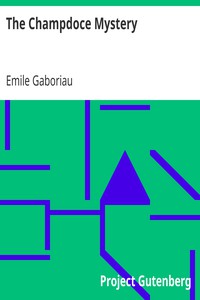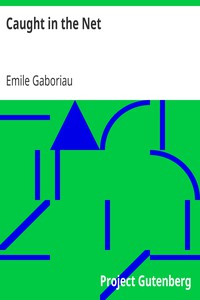The Champdoce Mystery, Emile Gaboriau [ebooks that read to you .TXT] 📗

- Author: Emile Gaboriau
Book online «The Champdoce Mystery, Emile Gaboriau [ebooks that read to you .TXT] 📗». Author Emile Gaboriau
“No, it is true; a gentleman came up to me, and said, ‘Madame, if you will cry out now, Andre, it is I—your Sabine; help! I will give you two louis.’ Of course I agreed. He gave me the fifty francs, and I did as he asked me.”
“What was this man like?”
“He was tall, old, and very shabby and dirty, with glasses on. I never set eyes on him before.”
“Do you know,” returned the commissaire sternly, “that the words you have uttered have caused the death of the poor fellow who has just fallen from the house?”
“Why did he not take more care?” asked she indifferently.
Palot, with an angry gesture, handed her over to a police-constable.
“Take her to the station-house,” said he, “and do not lose sight of her, for she will be a most important witness at a trial that must soon come on.”
“What the woman says is true,” muttered Palot. “She did not know what she was doing, and it was Tantaine that gave her the two coins. He shall pay for this; but certainly, if the whole gang are collared, it won’t bring the poor young fellow to life.”
He had, however, not much time for reflection, for he had to gather up every link of evidence. How was it that this accident had occurred? The frame of the window had fallen out with Andre, and lay in fragments on the pavement. He picked up one of the pieces, and at once saw what had been done; the woodwork had been sawed almost in two, and the putty with which the marks of the cuts had been concealed still clung to the wood. Palot called one of the workmen, who appeared to be more intelligent than his fellows, pointed out the marks to him, and bade him gather up the fragments and put them in some place of security. This duty being accomplished, Palot joined the crowd; but he was too late, for Andre had been taken away to the hospital. He looked around to see if there was any one from whom he could gain information, and suddenly perceived on a bench some one whom he had often followed. It was Toto Chupin, no longer clad in the squalid rags of a day or two back. He was dressed in gorgeous array, but his face was livid, his eyes wild, and his lips kept moving convulsively, for he was a victim to a novel sensation—the pangs of remorse—and was meditating whether he should not go to the nearest police-station and give himself up, so that he might revenge himself on Tantaine, who had made him a murderer. For a moment the idea of arresting Toto passed through Palot’s mind, but he, after a moment’s thought, muttered,—
“No; that would never do. We should risk losing the whole gang. Besides, he can’t get away. I may even have committed an error in arresting that woman. My master will say that I am not to be trusted. He placed one of his friends in my charge, and this is what has happened. I knew that the young man’s life was in deadly peril, and yet I let him enter a house in the course of erection; why, I might as well have cut his throat myself.”
In a terrible state of anxiety, Palot presented himself at the hospital, and asked for the young man who had just been brought in.
“You mean Number 17?” returned one of the assistant-surgeons. “He is in a most critical state; we fear internal injuries, fracture of the skull, and—in fact, we fear everything.”
It was two days before Andre recovered consciousness. It was midnight when he first woke again to the realities of life. At a glance he guessed where he was. He felt pain when he endeavored to turn over, but he could move his legs and one arm.
“How long have I been here, I wonder?” he thought.
He tried to think, but he was weak, and thoughts would not come at his command, and in a few seconds he dropped off to sleep again; and when he awoke, it was broad day; the ward was full of life and motion, for it was the hour of the house surgeon’s visit. He was a young man still, with a cheerful face, followed by the band of students. He went from bed to bed, explaining cases, and cheering up the sufferers. When Andre’s turn came, the surgeon told him that his shoulder was put out, his arm broken in two places, a bad cut on his head, while his body was one mass of bruises; but, for all that, he was in luck to have got off so easily. Andre listened to him with but a vague understanding of his meaning, for, with the return of reason, the remembrance of Sabine had come, and he asked himself what would become of her while he was confined to his bed in the hospital. As this thought passed through his mind, he uttered a faint groan. One of the students, a stout person, with red whiskers, a white tie, and a rather shabby hat, who looked as if he had just arrived from the country, stepped up to his bed, and leaning over the patient, murmured, “Lecoq.” Andre opened his eyes wide at the name.
“M. Lecoq,” gasped he, wondering at the excellence of the disguise.
“Hush, who knows who is watching us? I come to give your mind ease, which will do you more good than all the doctor’s stuff. Without in any way committing you, I have seen M. de Mussidan, and have furnished him with a valid excuse for postponing his daughter’s marriage for another month. You must remain here; you could not be in a place of greater security; but even here you cannot be too cautious. Eat nothing that is no given you by some one who utters the word ‘Lecoq.’ M. Gandelu will certainly call to see you. If you want to see or write to me, the patient on your right will manage that; he is one of my men. You shall have news every day; but be patient and prudent.”
“I can wait now,” answered the young man, “because I have hope.”
“Ah,” murmured Lecoq, as he moved softly away, “is not hope the true secret of life and happiness?”
CHAPTER XXXIV. THE DAY OF RECKONING.
M. Lecoq enjoined prudence and caution on Andre, and the utmost care on the part of his agents, because he was fully aware of the skill and cunning of the adversary with whom he had to cope.
“You should not talk or make a noise,” he would say, “when you are fighting.”
He could now prove that the head of this association, the man who concealed his identity under a threefold personality, was the instigator of a murder. But he did not intend to make use of this discovery at once, for he had sworn that he would take the whole gang, and his proceedings had been so carefully conducted that his victims did not for a moment suspect the net that was closing around them. The day after the accident to Andre, Mascarin sent an anonymous communication to the head of the police, giving up Toto as the author of the crime, and saying where he





Comments (0)